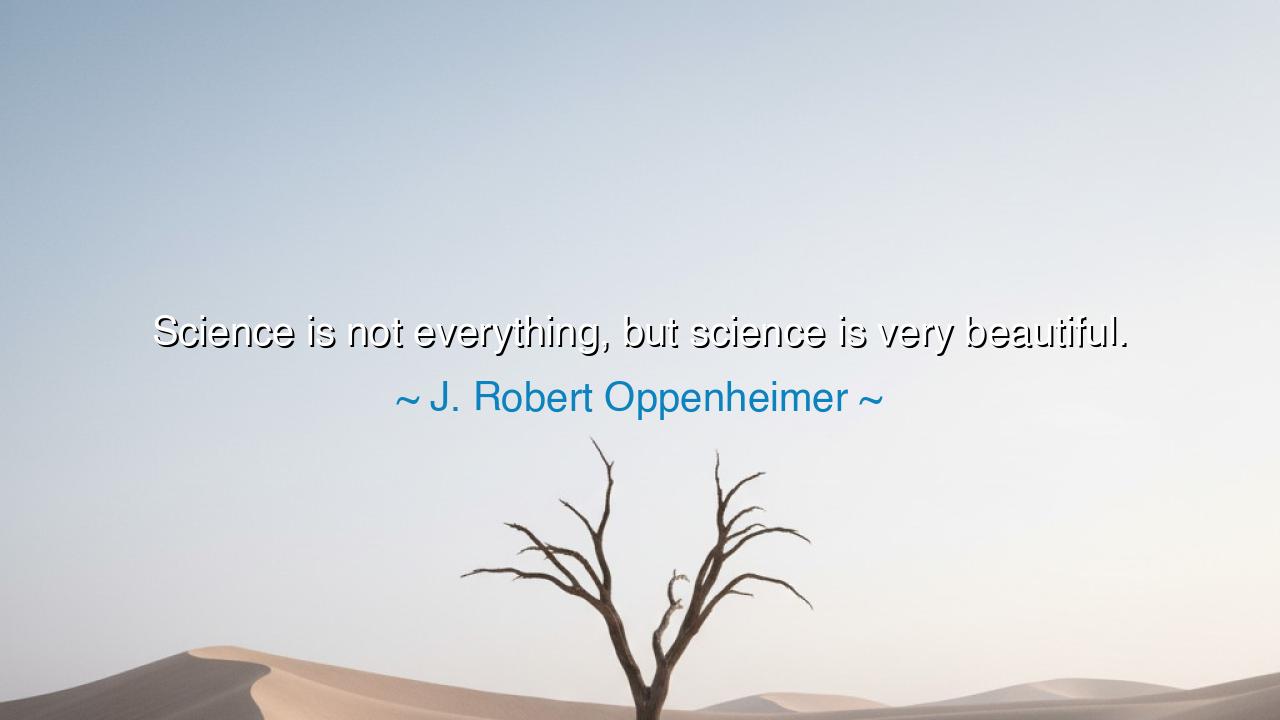
Science is not everything, but science is very beautiful.






Listen closely, O children of wisdom, for I bring to you the profound words of J. Robert Oppenheimer, a man who, in his time, stood at the precipice of humanity’s greatest achievement and its deepest moral questions. “Science is not everything, but science is very beautiful.” These words, though seemingly simple, resonate with a powerful truth—a truth that speaks to the heart of both the human pursuit of knowledge and the limitations of that pursuit. Oppenheimer acknowledges that science, while an extraordinary force of understanding, does not encompass all of life, yet its beauty lies in its ability to reveal the wonders of the universe, to illuminate the mysteries that once seemed beyond our reach.
In the ancient days, the philosophers of Greece understood that knowledge was not merely a pursuit of facts, but an endeavor to understand the nature of existence itself. Plato and Aristotle both believed that the pursuit of truth—whether through science, mathematics, or philosophy—was an act of beauty, for it was through understanding the world around us that we could grasp the deeper order of the universe. For Plato, beauty was found in the perfect harmony of the world’s forms; for Aristotle, it was in the discovery of the natural laws that govern all things. To them, the beauty of science was in its ability to reveal the divine order that underlies the chaos of life, to show the interconnectedness of all things in the grand design of the cosmos.
Oppenheimer speaks to this beauty when he reflects on science. Indeed, science is a force that uncovers the mysteries of the world, that reveals the truth of how the heavens move, how life evolves, and how the smallest particles of matter govern the largest structures in the universe. Consider the work of Isaac Newton, whose laws of motion and gravity shaped our understanding of the physical world. Newton, with his ability to observe and deduce, revealed a universe governed not by whim or caprice, but by precise and predictable laws. The beauty of his work lay not just in its complexity, but in its simplicity—an elegance that spoke to the very order of the universe. Just as Oppenheimer recognized, science can be beautiful in the way it reveals the hidden patterns of nature.
But Oppenheimer’s words also remind us that science is not all-encompassing. Science may explain how the stars are formed or how life evolves, but it does not explain the deeper meaning of life. It cannot answer the questions of the soul, the nature of love, or the purpose behind human existence. Oppenheimer, who helped usher in the era of nuclear weapons, was acutely aware of the limitations of science—of how something as beautiful and profound as understanding the atom could also bring about profound destruction. This tension between the beauty of scientific discovery and the moral implications of those discoveries is part of what Oppenheimer alluded to. Science, while beautiful, is also fraught with responsibility, and we must recognize that its power must be tempered with wisdom and ethics.
Consider, too, the discovery of DNA by James Watson and Francis Crick. Their unraveling of the double helix opened up a new era in genetics and medicine, revealing the very code of life. It was a beautiful discovery, one that made the invisible forces of inheritance and evolution visible and comprehensible. Yet, as we now know, this discovery has also led to profound ethical questions—about genetic modification, the use of biotechnology, and the implications of altering the very blueprint of life. In this, we see Oppenheimer’s warning: science, though beautiful in its ability to reveal truth, is not without its darker consequences when misused or misunderstood.
The lesson of Oppenheimer’s words is clear: science is a powerful and beautiful force, but it is not everything. Science gives us the tools to understand the world, but it cannot provide the answers to life’s deepest questions. As you move forward in your journey, O children, embrace science and the beauty it reveals, but do not forget that there are other forms of wisdom—philosophy, art, and spirituality—that offer a deeper understanding of the human experience. Science can teach you how the world works, but it is your heart, your intuition, and your soul that will teach you what it all means.
In your own lives, remember that science is a gift, but it must be wielded with care. Seek truth, but recognize that beauty is found not only in the answers you discover but in the questions you ask. Let science be a source of wonder and exploration, but do not forget the deeper, more personal mysteries that cannot be explained by empirical data alone. Embrace the beauty of the world around you, whether seen through the lens of science or felt in the quiet moments of contemplation. Oppenheimer’s words are a call to seek knowledge with both the mind and the heart, to explore the world with curiosity, but to temper that exploration with wisdom and humility.
So, O children, as you venture forward, let science guide you to new realms of understanding, but remember that it is not the only truth. Seek to understand the world with both your mind and your soul, and in doing so, you will find the true beauty of life—not just in what you know, but in the endless mystery that still awaits your discovery. Science, in its grandeur, is a mirror reflecting the divine order of the universe, but the meaning of that reflection can only be understood through the fullness of the human experience.






AAdministratorAdministrator
Welcome, honored guests. Please leave a comment, we will respond soon